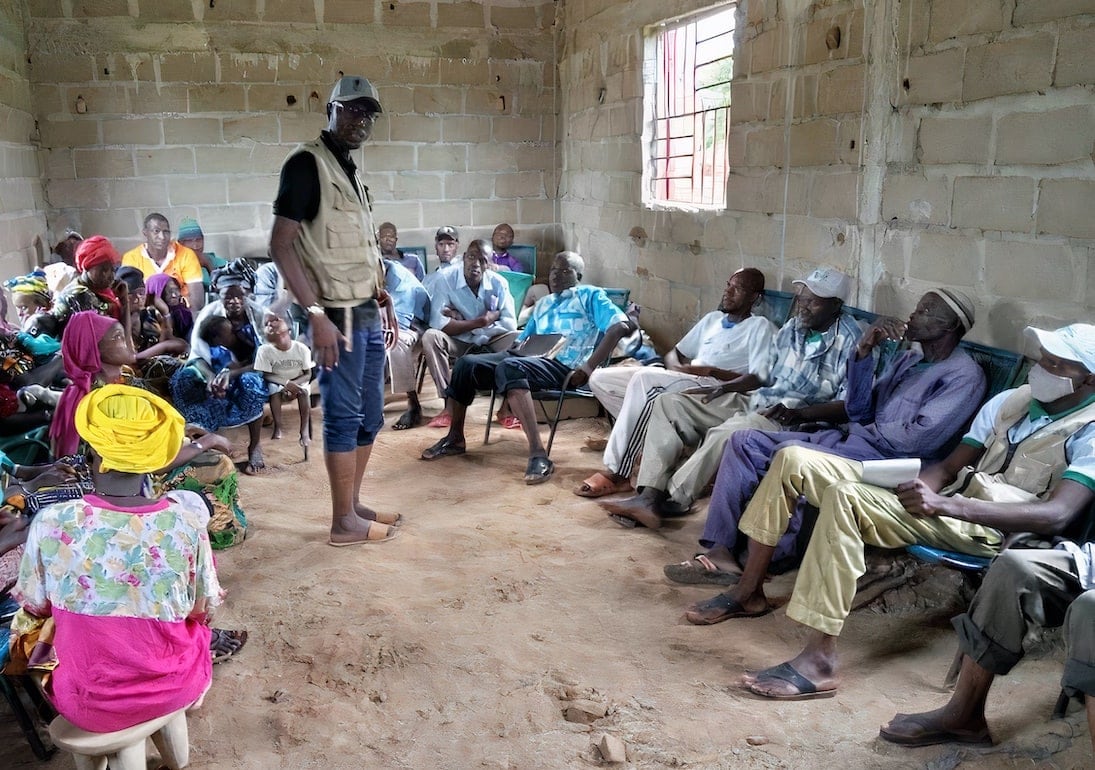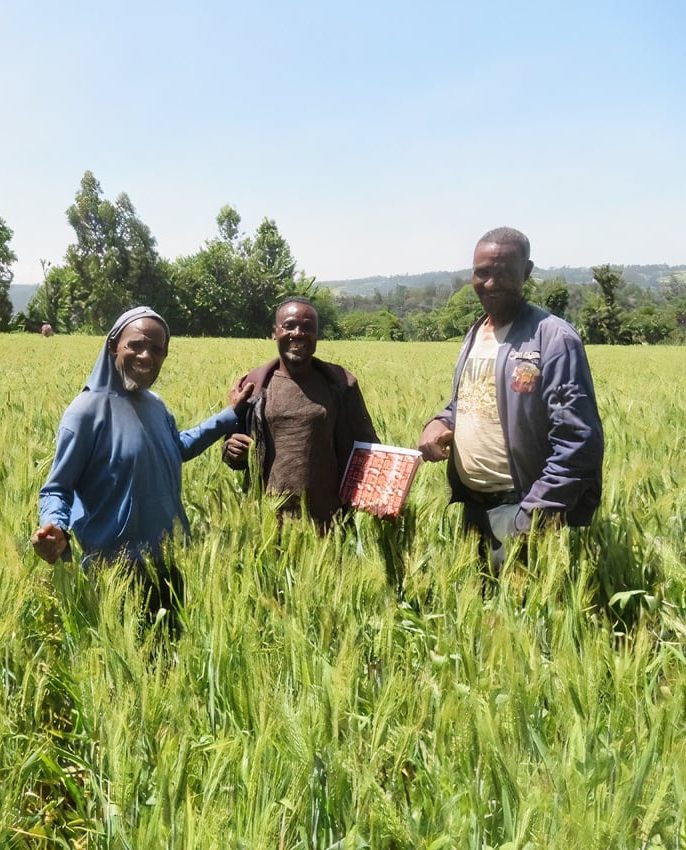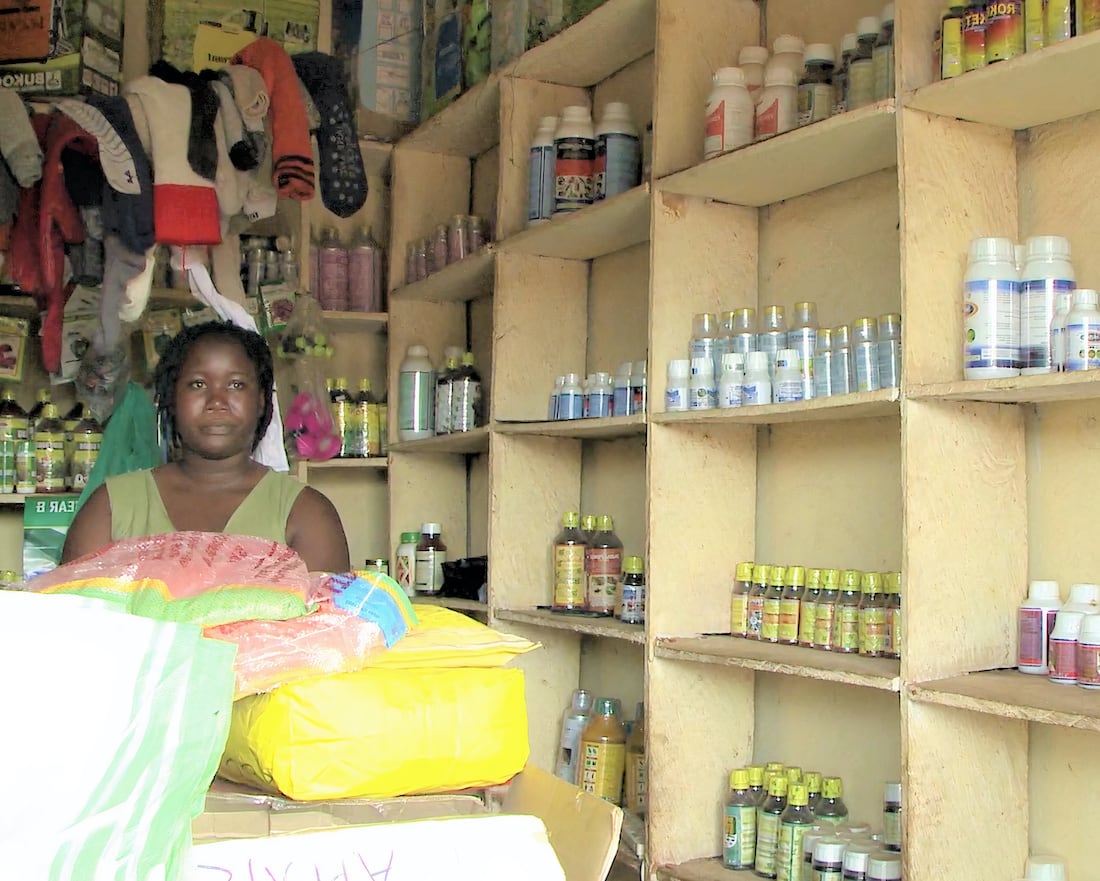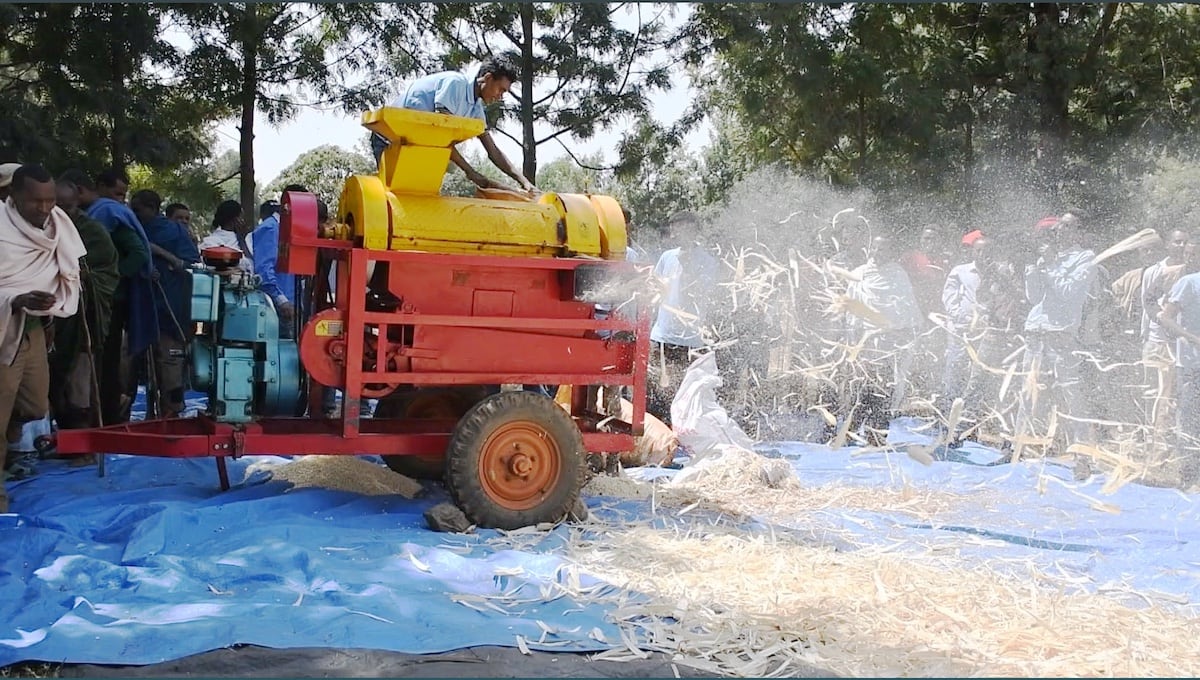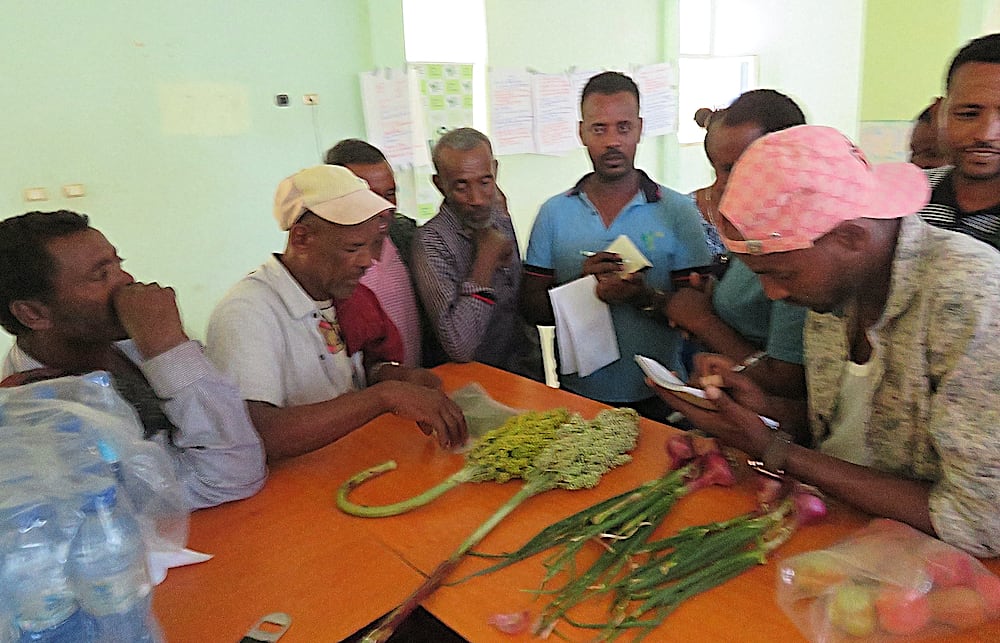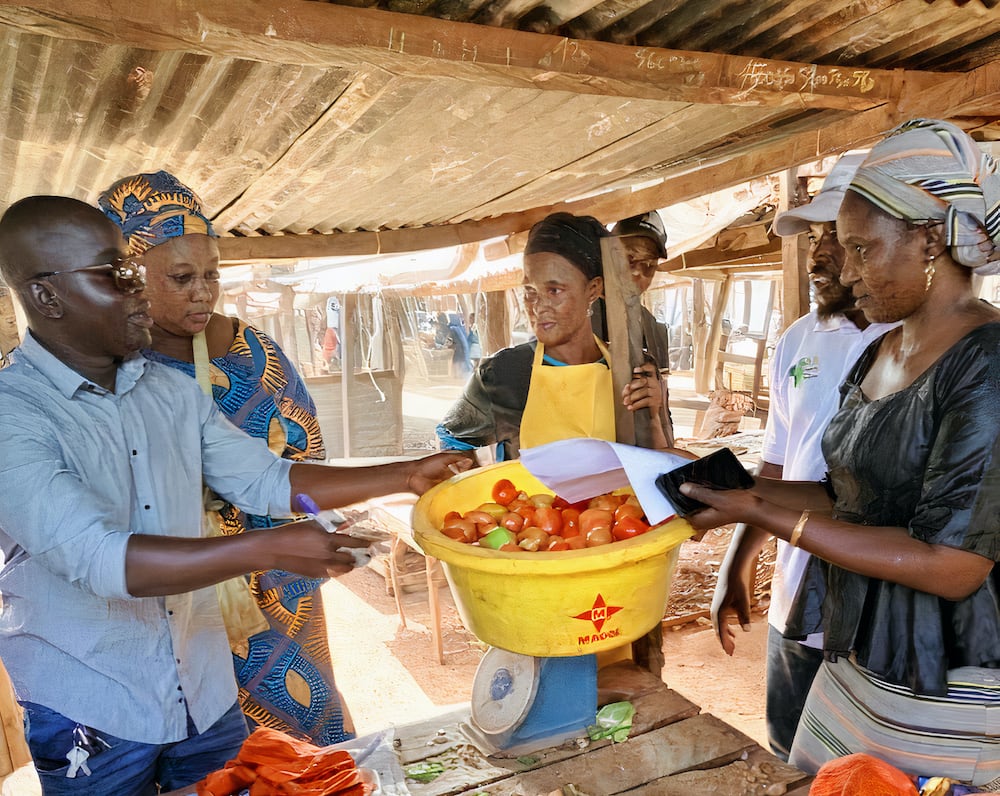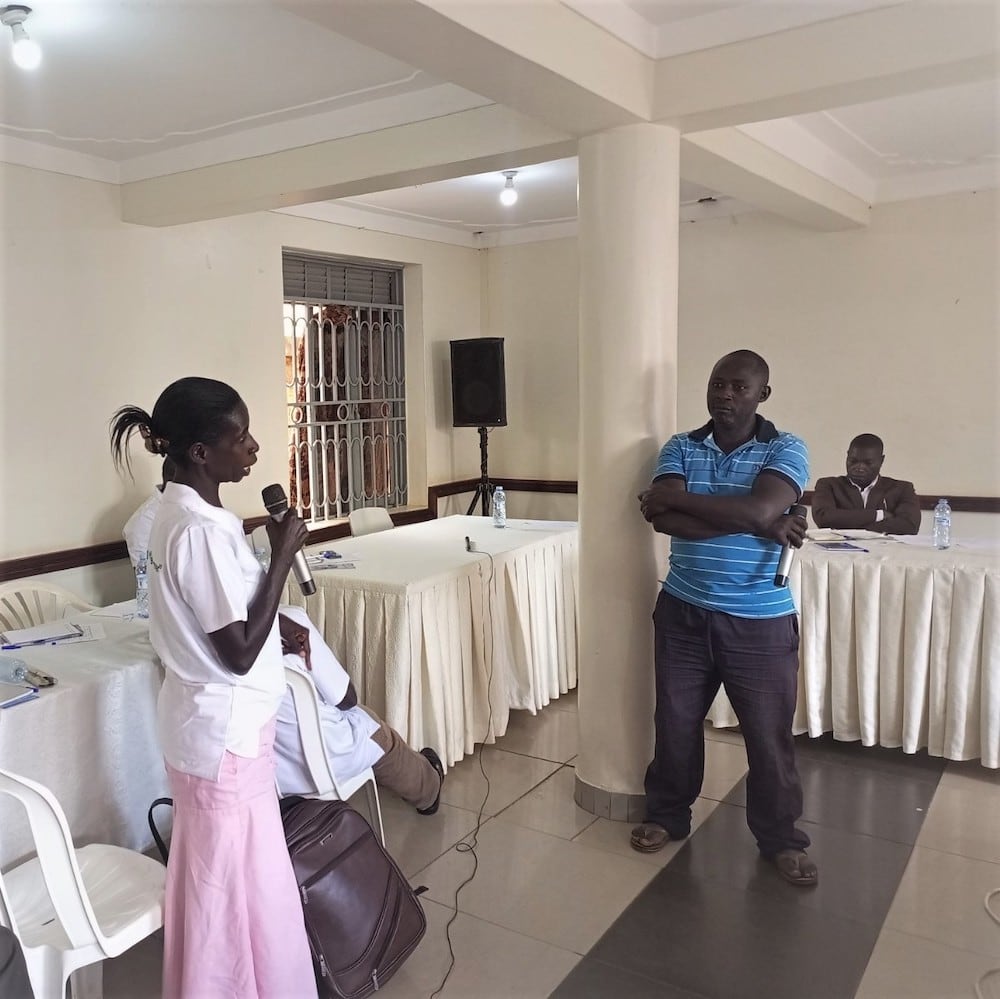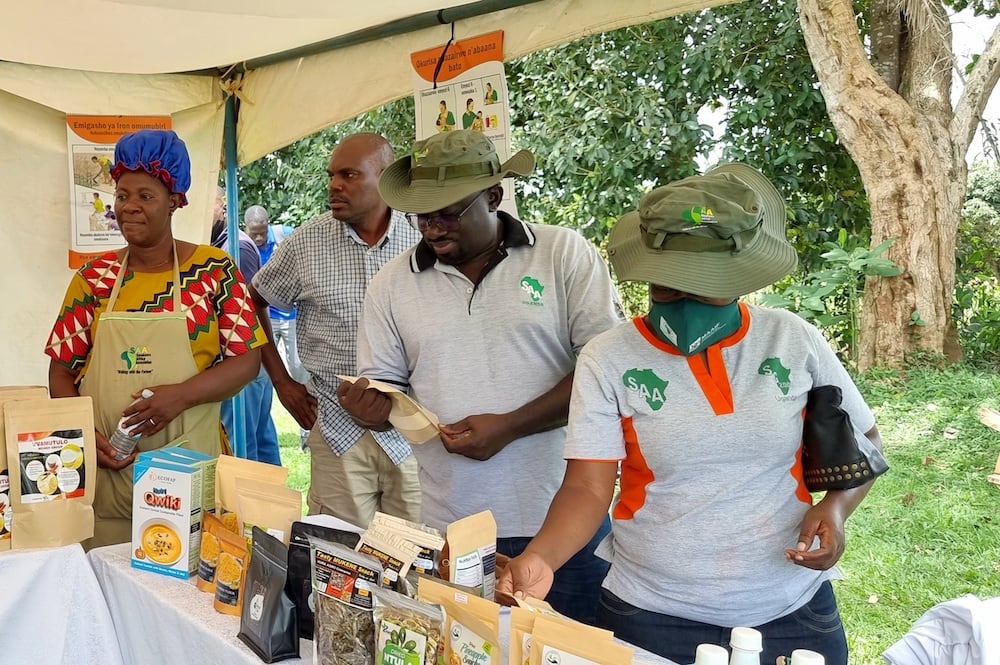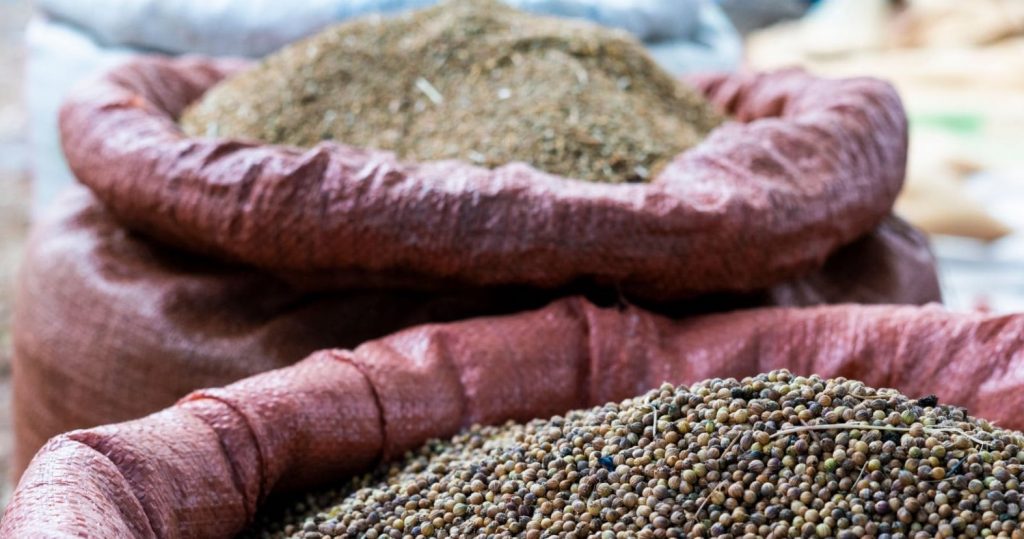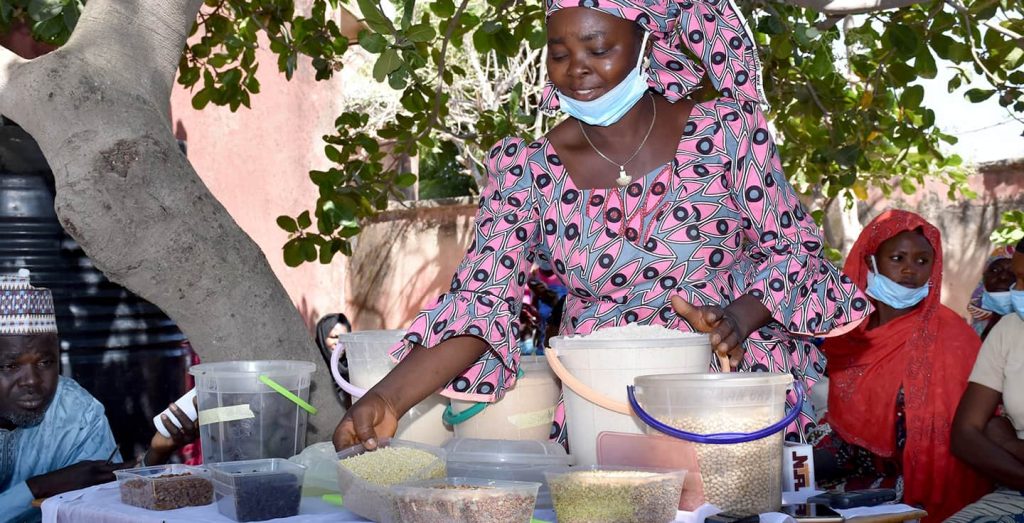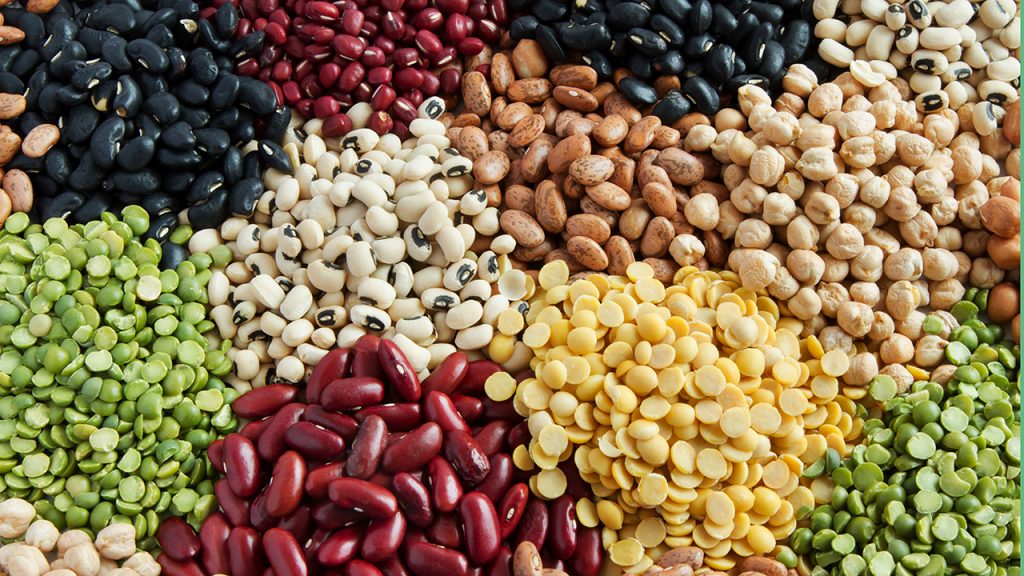First Edition of 2023
January 2023
Message from the President
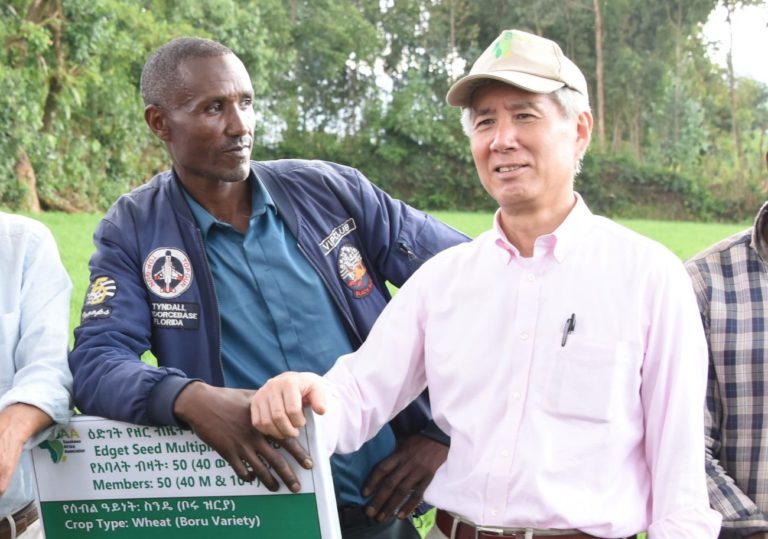
Message from the President
Happy New Year! I am happy to share the first issue of SAA’s newsletter for 2023, focusing on Market-Oriented Agriculture (MOA). Some might associate MOA with only large-scale farming; however, it is an important aspect for smallholder farmers, as farming is a creative business that requires constant decision-making. MOA helps improve incomes and livelihoods, regardless of one’s plot size.
For over 35 years, SAA has worked with millions of smallholder farmers, and among them, the successful entrepreneurs have a mindset to “produce to sell”, rather than “produce and sell”. They’re always mindful of which varieties of crops to grow, where to plant them, and what fertilizers to apply. Further, the farmers are sensitive to market trends. These maximize the gain from their limited land and financial resources. SAA has been striving to create this mindset through the promotion and adoption of the SHEP (Smallholder Horticulture Empowerment & Promotion) approach.
SAA builds the capacity of farmer-based organizations (FBOs) focusing on business planning, organizational management, and leadership. One successful approach promoted by SAA in this regard is the One-Stop Center Associations (OSCAs) in Uganda. OSCAs are FBOs engaged in a range of activities for example, crop and horticulture production, management of agro-input shops and commodity, provision of extension services, investment, grain marketing, and storage. As a result, some OSCAs have reached the level of exporting produce to neighboring countries, accumulating capital and contributing to local job creation.
These initiatives are just some examples of SAA’s MOA initiatives across the program countries, which we are excited to share with you this year.
President,
Makoto Kitanaka
OVERVIEW OF MOA
OVERVIEW OF MOA
Activities in Mali
Sasakawa Africa Association-Mali implements various activities along the Market-Oriented Agriculture component. These activities include capacity building on community-based seed multiplication, contract farming, market research, organizing a national seed fair, cooperative management, and business development. The Integrated Seed Sector Development in the Sahel (ISSD-Sahel) Project emphasizes on linking farmers to microfinance institutions and seed companies. A total of 1,169 farmers and value-chain actors such as extension agents, seed companies, agro-processing centers, Commodity Association Trainers, and traders participated in the activities in 2022, as depicted in the graphic below.
OVERVIEW OF MOA
OVERVIEW OF MOA
Activities in Ethiopia
The agricultural extension system in Ethiopia encourages a Market-Oriented extension approach and transforms farming from subsistence to business. In alignment with this, one of SAA’s strategic pillars is Market-Oriented Agriculture (MOA) which empowers smallholder farmers to shift their mindset from “grow and sell” to “grow to sell”. SAA takes into consideration the economic opportunities and unique market characteristics that exist in different agro-economic climates. This enables farmers to take advantage of opportunities created by new technologies and improved agronomic practices in crop production, postharvest management, and market information system. This ensures the farmers have a better market for their commodities.
Smallholder farmers, engaged in seed production and marketing, agro dealership, saving and credit association, and commodity marketing businesses, have been capacitated with technical knowledge and skill enhancement trainings, working capital, and market linkage and market information systems. So far, 1,061 (386 women) farmers/entrepreneurs and 63 (13 women) Extension Agents (EAs) have benefited from different SAA capacity development schemes. SAA created market linkage for two Community-Based Seed Multiplication (CSBM) groups established in Angacha district. The groups consisted of 103 (21 women) members with the aim of multiplying improved wheat seeds. A CBSM group in Kerekicho Kebele covered 12.5 hectares of land, with the seed accessed from Zereta Kembata cooperative union benefiting 50% credit and the group is planning to supply the seed to the Cooperative Union.
OVERVIEW OF MOA
OVERVIEW OF MOA
Activities in Uganda
Sasakawa Africa Association (SAA), under the Market-Oriented Agriculture pillar, equips smallholder farmers and extension agents with business and entrepreneurship skills to raise their income by sustainably increasing productivity in response to market demand.
At the beginning of the year, 2022, with funding from The Nippon Foundation (TNF), SAA-Uganda conducted a farmer-led market survey. 96 (41 women) farmers and 72 (22 women) Extension Agents (EA) took part in the survey to inform production capacity. Several produce buyers in the Northern and Western parts of the country were visited during the process. This was subsequently followed by training of 7,308 farmers trained on, Gross Margin Analysis (GMA), enterprise budgeting to ensure the right enterprises with high profit margins are selected.
Before the onset of the season (March to April) with funding from TNF and WFP, SAA conducted training for 63 (27 women) agro-input dealers and Community Association Traders/Trainers. The training focused on safe use of agro-chemicals, business planning and management. The training increased the number of skilled input dealers and shops to enable farmers easy access to quality inputs. As a result, 21 new agro-input shops have been opened and 16 agro-input businesses formally registered. This was done in partnership with the Ministry of Agriculture, Animal Industry, and Fisheries (MAAIF), Makerere University and District local government leadership.
Midseason (June-July) ToTs were conducted for 130 (50 women) EAs, focusing on agricultural marketing skills and market dynamics. The competent trainers equipped 3,118 (1,417 women) farmers with skills in establishment and management of credit and savings for investment in agriculture (CSIA) groups. This has enabled farmers to save $183,323 to improve access to finances, expand production and meet basic needs at household level. The farmers were also linked to formal financial institutions and were able to access $69,234 for reinvestment in agribusiness.
Partnerships have been key for sustaining SAA’s interventions, a total of 180 (79 women) leaders from 7 farmer organizations were trained on basic concepts of partnership formulation, management and, setting production targets to improve farm business planning and management for collective action.
While Africa has been well-known as one of the world’s fastest-growing regions with the youngest population, economic development and employment creation are not happening at the same rate at of population growth, especially in the rural area. In 2022, SAA skilled 195 youth entrepreneurs through the Youth Business Clinics (YBC). Young agri-preneurs were trained and 222 agribusinesses were awarded grants worth $6,486 for expansion. YBCs offered practical business management courses, aimed at igniting entrepreneurship in the mentees, creating jobs and shaping their business dreams into reality. Among the identified business ideas were input dealers, produce bulking and marketing, horticulture production, piggery, poultry, Apiary, goat rearing and bakery among others.
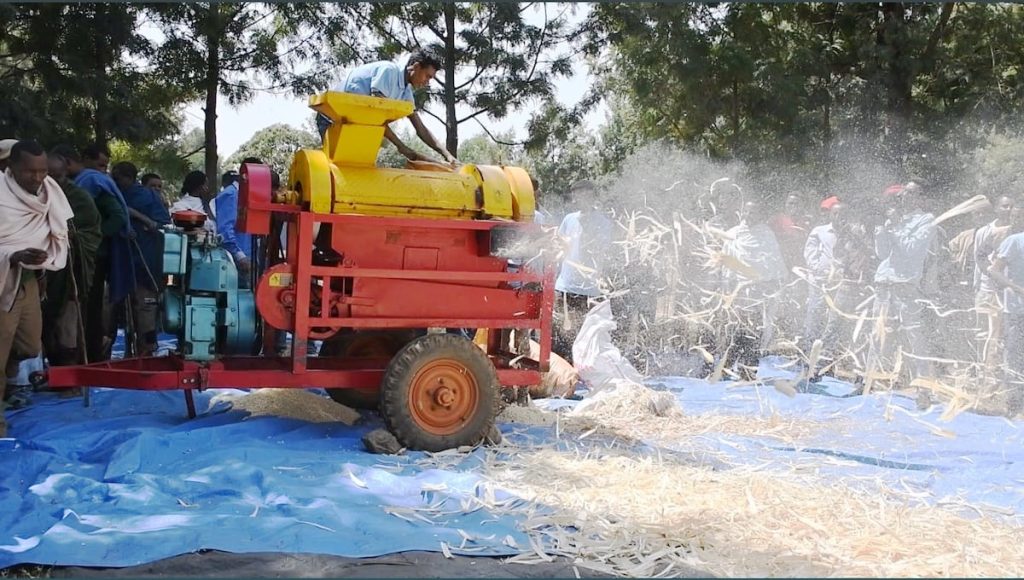
VOICES FROM THE FIELD
VOICES FROM THE FIELD
From unemployment to business ownership
In December 2019 the Misrak Agro dealers’ group was organized under the IMPACT project in the Amhara Region’s Bure Zuria district. Starting with three members, the group has grown to five (three women) members with the goal of promoting improved post-harvest technologies and creating jobs for the youth, whose educational background ranges from 10th grade to BSc degree.
Bure Zuria district is an area with high potential for maize production, however limited access to post-harvest technologies. Farmers in the district used to shell their maize manually and hire tedious and time-consuming labor that resulted in post-harvest losses and lower grain quality. As part of its post-harvest technology promotion, SAA under the IMPACT project provided a maize sheller with a cart to the group.
The group began a maize shelling service provision for 85 farmers in the surrounding communities, shelling about 232.7 MT of maize in one kebele, earning USD1,466. The youth group earned a gross profit of USD1,140 in one season alone, which is about 47% of the cost of the machine.
As shelling service is a seasonal activity, Misrak agro-dealers expanded their income by engaging in agro-dealership, through a seed money facilitated by the IMPACT project. Meeting Trade Bureau requirements, the group established an agro-inputs shop and began supplying a variety of agrochemicals.
In 2021, the group earned nearly USD2,000 as gross profit from a one-season shelling service and one month’s sales of agrochemicals. Aside from the profit, they demonstrated maize shelling technology to 390 farmers to raise awareness on the benefit of improved technologies.
Encouraged by the income from the two businesses and the satisfaction derived from the services that support communities, the group is looking into more diverse economic opportunities, such as woodwork and crop production by renting farmland. They are also saving their earnings for larger goals of high-value service provision, such as purchasing tractors for plowing and loading, and other large-scale investment activities. “Mark our words, we will become major investors in the near future,” the group declared.
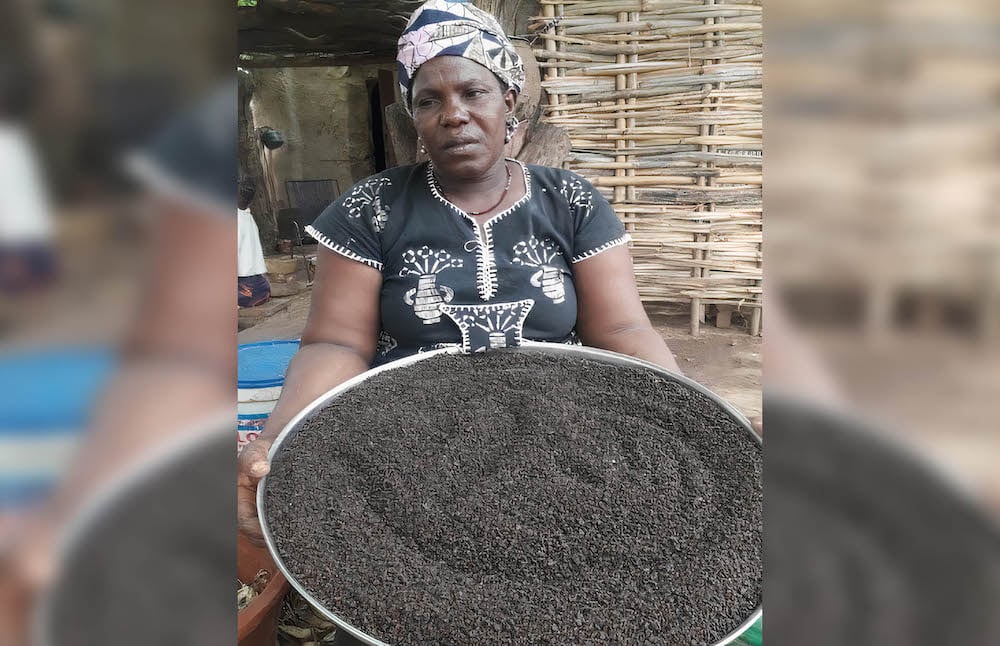
VOICES FROM THE FIELD
VOICES FROM THE FIELD
Facilitating access to agricultural credit for women in Mali
The Siranikoto Production Post Harvest and Trade Center (PHTC), supported by SAA-Mali, has 41 groups of Community Savings for Investment in Agriculture (CSIA). Each group constitutes an average of 20 members and the groups saved 4,773,400 FCFA (USD7,343) in 2022.
Through a workshop organized by SAA-Mali, to link women farmers with Nyèsigiso Savings and Credit Union, members were able to get a low-interest short-term credit of around 500,0000 FCFA (USD769) to start income generation activities.
Minata COULIBALY, CSIA member in the Tonkaralaton said, “Before the establishment of our CSIA group, I had never got a credit more than 15,000 FCFA (USD23), but now with the set-up supported by SAA, I can now borrow 25,000FCFA (USD38), which allows me to improve my grocery store. Today my activity runs well.”
Another beneficiary AWA DAMBA said, “Thanks to this CSIA initiative, we women who have had very limited access to get loans from MFI can now have a loan of 50,000FCFA (77 USD). I invested it in my horticulture farm where I grow sweet potato, onion, okra, and lettuce. I am very satisfied and able to repay all my credit and improve my life ”.
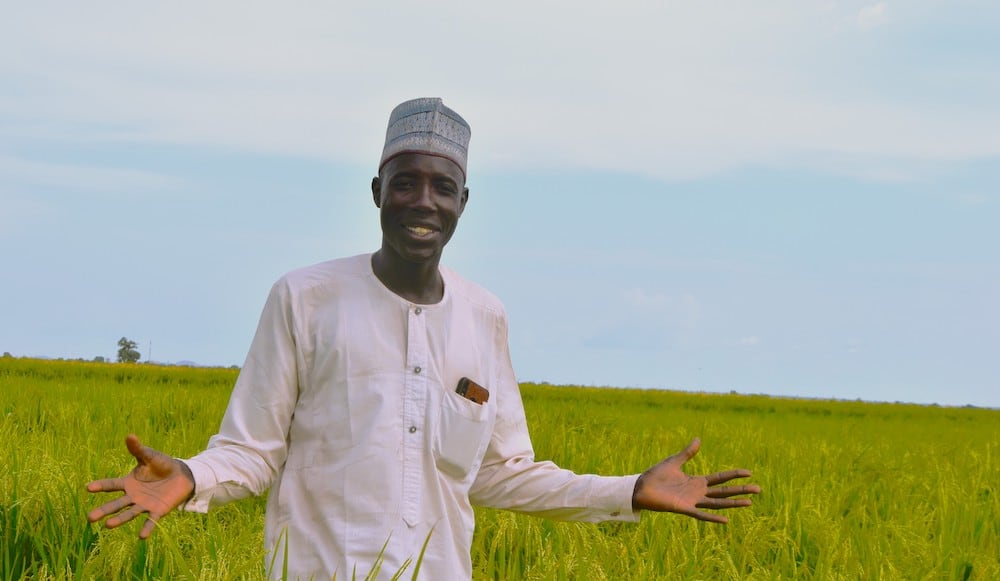
VOICES FROM THE FIELD
VOICES FROM THE FIELD
Developing agribusiness through Community-based Seed Multiplication in Nigeria
Chiromawa community, Kura LGA, Kano state Nigeria, is an area considered the rice hub of the state due to the enormous resources endowed with rice cultivating, processing, and other value chain activities by smallholder farmers. However, the farmers need access to improved seeds to maximize their yield.
As a part of the Kano state Agropastoral development project (KSADP) funded by the Islamic Development Bank, SAA-Nigeria promoted Community-based Seed Multiplication (CBSM) model during the 2022 wet farming season. The model enhanced the community’s access to improved quality seeds, which are early maturing and resistant to pests and diseases.
One of the beneficiaries, a host farmer of the CSBM, Alhaji Babangida Kura, said, “I was happy to get the quality seeds and inputs from Sasakawa. In my community, we usually plant old seeds with low yields, requiring longer maturity period, and are highly susceptible to pest and disease attack.”
After receiving several training modules on improved planting methods, fertilizer application, and pest and disease control, Kura almost doubled rice production, which is 7.8 Mt/ha, against the 4.0 Mt using conventional farmer practices.
Benefiting from the market linkages facilitated by SAA, Kura sold 6.0 Mt of the seeds to Premier seeds company at 1,450,000 (USD 3,500). He used the proceeds to buy a plot of land for his farming activities.
Kura said he is now a registered seed grower with the Premier seeds company and is looking forward to helping farmers in his community to access quality seed varieties.
The CBSM system, supervised by the National Seed Council (NSC) for quality control, ensures that farmers have sustainable timely access to quality seeds.
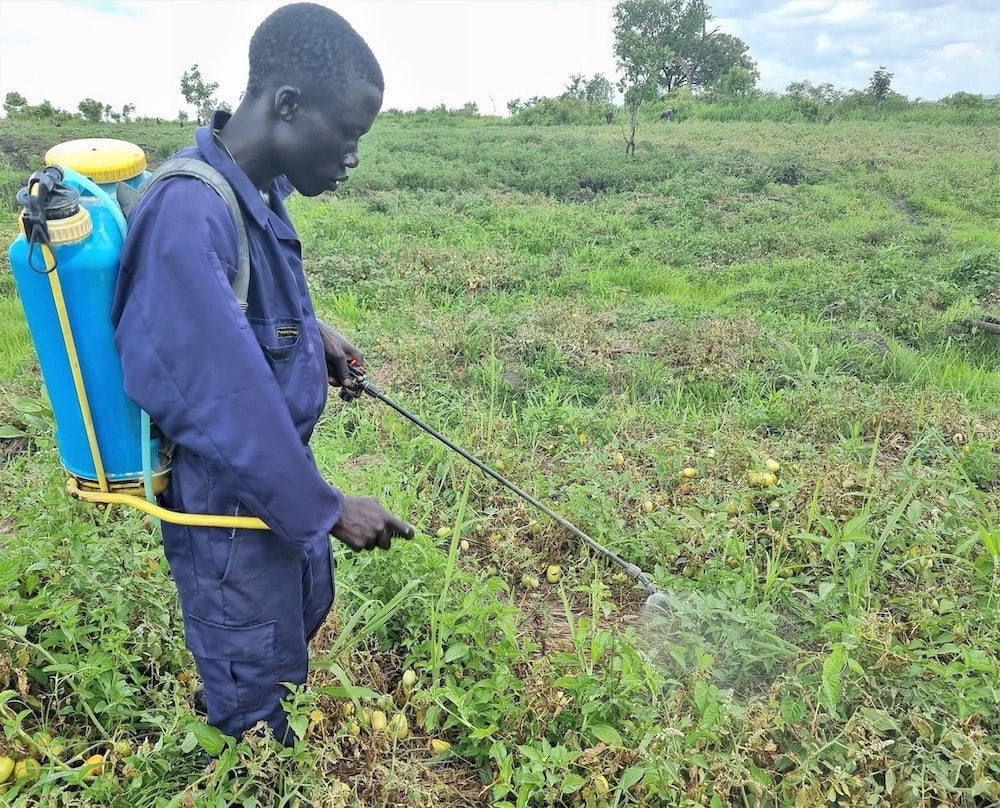
VOICES FROM THE FIELD
VOICES FROM THE FIELD
Creating jobs for youth through Market-Oriented Horticulture Production in Uganda
Peter Vundru, 23 years old, is from Adjumani district in Uganda and was forced to drop out of school, due to a lack of income for school fees. Being a resourceful man, staying unemployed was not an option. Inspired by his parents who had a backyard garden for their livelihood, Peter started growing tomatoes, cabbage, and okra and has become a successful entrepreneur and model in his community.
In September 2021, Peter’s farmers’ group called Ama Ebeku, with 20 members (6 women), was selected as a beneficiary of the Smallholder Horticulture Empowerment and Promotion (SHEP). The project is implemented by SAA-Uganda in collaboration with the International Food Policy Research Institute (IFPRI) and funded by the Government of Japan. The programme promotes Market-Oriented Horticulture farming in refugee-hosting sub-counties of Adjumani district. Under the project, a market survey is conducted ahead of the season to help farmers identify marketable produce to grow.
“I was equipped with good agronomical practices, such as proper site and quality seed selection, timely land preparation and proper planting, timely weeding, pest and disease management, line planting, right seed rate, and farming as a business among others,” Peter said. “This year, I planted 40 gms of Asilla FI and 100 gms Rio- grande tomato varieties in January 2022 on 2 acres of land using the skills I acquired; and for the first harvest, I got 18 boxes which earned UGX 7,200,000(USD1,868). Later on, I harvested 12 more boxes worth UGX 4,800,000 (USD1,316),” he added.
From his profit, Peter bought a motorcycle and better-yielding seed varieties for the next season. He has since become a model farmer that supplies tomatoes in his community and the main district market, Awindiri.
Peter plans to buy a small-scale solar-powered irrigation system to use during dry spells and fence off his farm to keep livestock out. He is also giving back by employing youths who have dropped out of school due to financial restraints.
ACTIVITIES
ACTIVITIES
Capacity building on the SHEP approach in Ethiopia
From 12-21 October 2022, SAA-Ethiopia organized training on Smallholder Horticulture Empowerment and Promotion (SHEP) approach. The training was part of its effort to promote Market-Oriented Agriculture (MOA) in Kewot district of the Amhara Region, Ethiopia. The training was provided to 123 (9 women) Extension Agents (EAs), farmers, Multipurpose Primary Cooperatives (MPCs) committees of Tere and Medina kebeles, and agricultural input/output market actors.
The training focused on the concepts of MOA with a target of shifting from “grow and sell” to “grow to sell” concept, identifying commodities and market actors, revising market survey tools for SHEP, and exercising the agricultural market survey. As a result, the producers agreed to aggregate members’ produces and provide 200 MT of onion to the vegetable wholesaler’s market.
ACTIVITIES
Capacity building on the SHEP approach in Ethiopia
From 12-21 October 2022, SAA-Ethiopia organized training on Smallholder Horticulture Empowerment and Promotion (SHEP) approach. The training was part of its effort to promote Market-Oriented Agriculture (MOA) in Kewot district of the Amhara Region, Ethiopia. The training was provided to 123 (9 women) Extension Agents (EAs), farmers, Multipurpose Primary Cooperatives (MPCs) committees of Tere and Medina kebeles, and agricultural input/output market actors.
The training focused on the concepts of MOA with a target of shifting from “grow and sell” to “grow to sell” concept, identifying commodities and market actors, revising market survey tools for SHEP, and exercising the agricultural market survey. As a result, the producers agreed to aggregate members’ produces and provide 200 MT of onion to the vegetable wholesaler’s market.
ACTIVITIES
Changing producer’s mindsets in Mali through SHEP
On 20-23 November 2022, SAA-Mali organized a training-of-trainers (ToT) for Commodity Association Trainers/Traders (CATS), Extension Agents, and lead farmers in Fana, Doila Region. The aim of the training was to build commercial capacities through the Smallholder Horticulture Empowerment and Promotion (SHEP) approach and change producers’ mindset from “produce and sell” to “produce to sell”, increasing their income. A total of 35 (8 women) people benefited from the training on market study, crop selection and business planning.
ACTIVITIES
Changing producer’s mindsets in Mali through SHEP
On 20-23 November 2022, SAA-Mali organized a training-of-trainers (ToT) for Commodity Association Trainers/Traders (CATS), Extension Agents, and lead farmers in Fana, Doila Region. The aim of the training was to build commercial capacities through the Smallholder Horticulture Empowerment and Promotion (SHEP) approach and change producers’ mindset from “produce and sell” to “produce to sell”, increasing their income. A total of 35 (8 women) people benefited from the training on market study, crop selection and business planning.
ACTIVITIES
Bringing together value chain actors to create synergies in Uganda
On 23rd September 2022, SAA-Uganda conducted ‘the value chain actors marketplace workshops along the agricultural value chain, in Kiboga and Kole districts. This brought together a host of people including, smallholder farmers, community-based facilitators (CBFs), Commodity Association Traders/Trainers (CATs), Extension Workers (EWs), District Coordinators (DCs), agro input suppliers, financial service providers produce buyers, technology suppliers, information providers, and District Local Government (DLGs).
The value chain marketplace was attended by 111 (31 women) participants and sought to create an enabling environment for farmers and other value-chain actors to interact and create linkages. Among the issues discussed were the economic benefits of recently introduced and adopted technologies by the farmers, strategies to take advantage of market opportunities for maize, beans and soybean and agencies for input dealing.
ACTIVITIES
Bringing together value chain actors to create synergies in Uganda
On 23rd September 2022, SAA-Uganda conducted ‘the value chain actors marketplace workshops along the agricultural value chain, in Kiboga and Kole districts. This brought together a host of people including, smallholder farmers, community-based facilitators (CBFs), Commodity Association Traders/Trainers (CATs), Extension Workers (EWs), District Coordinators (DCs), agro input suppliers, financial service providers produce buyers, technology suppliers, information providers, and District Local Government (DLGs).
The value chain marketplace was attended by 111 (31 women) participants and sought to create an enabling environment for farmers and other value-chain actors to interact and create linkages. Among the issues discussed were the economic benefits of recently introduced and adopted technologies by the farmers, strategies to take advantage of market opportunities for maize, beans and soybean and agencies for input dealing.
ACTIVITIES
Easing access to services for smallholder farmers in Uganda
SAA developed and promoted the One-Stop Centre Associations (OSCAs) model in Uganda to enable smallholder farmers to access various agro-services across the value-chain. Collaborating with partners, SAA worked with the World Food Programme (WFP), National Agricultural Advisory Services (NAADS), JICA and others to build 11 OSCAs in Luwero, Buikwe, Iganga, Kibuku, Bugiri, Kamuli, Tororo, Lira, Mpigi, Busia and Kyenjojo districts. Zirobwe Agali Awamu Agri-Business Training Association (ZAABTA) is one such OSCAs; founded in 2004 in Luwero district, Uganda.
Since launching in 2004, ZAABTA serves six districts in Central Uganda and has grown its membership to over 14,000 registered farmers and has reached 21,000 farmers.
ZAABTA employs 18 full-time staff, six casual laborers and works with 40 village agents, 22 change agents, and 20 Community-Based Facilitators (CBFs). The employees train and supervise farmers on agricultural production, post-harvest management, and marketing as well as facilitate the delivery and collection of agro-input/output for/from farmers.
The work ZAABTA carries outs is vast and include the production of rice, maize, beans, horticulture and seeding, coffee processing, management of the stockiest shop, commodity investment, seed bank, grain marketing and storage, machinery and equipment hire, and various other agricultural extension services.
ZAABTA sells its products not only for its domestic market, but also exports to Kenya for an increased price estimating around 10-20% more. By the end of 2021, ZAABTA sold 2,800MTs of maize worth USD560,000, 1200 MTs of soybean worth USD1,028,571, 640MTs of beans worth USD365,714, and 1600MTs of rice worth USD1,142,857.
Over the next few years, ZAABTA has expansion plans underway. These include, upgrading to an Agribusiness center of excellence that trains and awards certificates for short courses in agribusiness. Constructing a bigger training hall with associated facilities, and purchasing more machinery for production and post-harvest management to provide service to its members and the community.
ACTIVITIES
Easing access to services for smallholder farmers in Uganda
SAA developed and promoted the One-Stop Centre Associations (OSCAs) model in Uganda to enable smallholder farmers to access various agro-services across the value-chain. Collaborating with partners, SAA worked with the World Food Programme (WFP), National Agricultural Advisory Services (NAADS), JICA and others to build 11 OSCAs in Luwero, Buikwe, Iganga, Kibuku, Bugiri, Kamuli, Tororo, Lira, Mpigi, Busia and Kyenjojo districts. Zirobwe Agali Awamu Agri-Business Training Association (ZAABTA) is one such OSCAs; founded in 2004 in Luwero district, Uganda.
Since launching in 2004, ZAABTA serves six districts in Central Uganda and has grown its membership to over 14,000 registered farmers and has reached 21,000 farmers.
ZAABTA employs 18 full-time staff, six casual laborers and works with 40 village agents, 22 change agents, and 20 Community-Based Facilitators (CBFs). The employees train and supervise farmers on agricultural production, post-harvest management, and marketing as well as facilitate the delivery and collection of agro-input/output for/from farmers.
The work ZAABTA carries outs is vast and include the production of rice, maize, beans, horticulture and seeding, coffee processing, management of the stockiest shop, commodity investment, seed bank, grain marketing and storage, machinery and equipment hire, and various other agricultural extension services.
ZAABTA sells its products not only for its domestic market, but also exports to Kenya for an increased price estimating around 10-20% more. By the end of 2021, ZAABTA sold 2,800MTs of maize worth USD560,000, 1200 MTs of soybean worth USD1,028,571, 640MTs of beans worth USD365,714, and 1600MTs of rice worth USD1,142,857.
Over the next few years, ZAABTA has expansion plans underway. These include, upgrading to an Agribusiness center of excellence that trains and awards certificates for short courses in agribusiness. Constructing a bigger training hall with associated facilities, and purchasing more machinery for production and post-harvest management to provide service to its members and the community.
ACTIVITIES
Promoting community savings and investment in agribusiness through rural farmer groups in Nigeria
In Nigeria there is a big problem facing the farming community, and especially women, with access to finance to procure farm inputs or to engage in petty businesses at the detriment of their families’ nutrition, health, and economy. To support the challenges faced by farmers, SAA embarked on sensitization and training of community members on the importance of collective action, primarily through the promotion of Community Savings and Investment in Agriculture (CSIA).
Through CSIA, members of the Kauna Women Multipurpose Cooperative Society, Yelwa-Dadin Kowa Yamaltu Deba LGA, in Gombe State have saved N1,600,000 (USD3,623.19). These savings have become a means for supporting its members in procuring farm inputs and livestock and engaging in petty businesses to improve their livelihoods.
The group comprises 28 women who engaged in group farming by making monthly contributions, periodic strategic procurement of agricultural produce, storage, and selling their produce collectively to grow the group’s fortunes to assist its members.
The group leader, Mrs. Agnes Danladi, said the group had received record-keeping and financial management training. As a result, they now keep proper records of meetings, fines, levies, monthly financial contributions, receipts, loans issued out and recovered, enabling them to understand their finances and profits better.
ACTIVITIES
Promoting community savings and investment in agribusiness through rural farmer groups in Nigeria
In Nigeria there is a big problem facing the farming community, and especially women, with access to finance to procure farm inputs or to engage in petty businesses at the detriment of their families’ nutrition, health, and economy. To support the challenges faced by farmers, SAA embarked on sensitization and training of community members on the importance of collective action, primarily through the promotion of Community Savings and Investment in Agriculture (CSIA).
Through CSIA, members of the Kauna Women Multipurpose Cooperative Society, Yelwa-Dadin Kowa Yamaltu Deba LGA, in Gombe State have saved N1,600,000 (USD3,623.19). These savings have become a means for supporting its members in procuring farm inputs and livestock and engaging in petty businesses to improve their livelihoods.
The group comprises 28 women who engaged in group farming by making monthly contributions, periodic strategic procurement of agricultural produce, storage, and selling their produce collectively to grow the group’s fortunes to assist its members.
The group leader, Mrs. Agnes Danladi, said the group had received record-keeping and financial management training. As a result, they now keep proper records of meetings, fines, levies, monthly financial contributions, receipts, loans issued out and recovered, enabling them to understand their finances and profits better.
EVENTS
EVENTS
SAA-Uganda takes part in 2022 World Food Day Commemoration
Uganda is known as the “food basket of the region’ however around 30% of Ugandans lacked enough food in 2021, according to the latest Afrobarometer survey. In 2019, 66% of Ugandans lacked the funds to purchase food. The food systems have been heavily challenged by climate change, Covid and conflict and exacerbated by rising prices, and international tensions; a situation that critically affects children, youths, and women.
In October, SAA-Uganda took part in the national commemorations to mark World Food Day 2022 held at the National Crops Resources Research Institute (NaCRRI) in Namulonge, Wakiso district. The theme of the event, ‘‘Leave NO ONE behind: Better Production, Better Nutrition, a Better Environment, and a Better Life,’ was presided by the Prime Minister of Uganda, Robinah Nabbanja. FAO representative to Uganda Antonio Querido said “To leave no one behind means leaving no stone unturned and creating an enabling environment where no one goes to be hungry.”
During the exhibition organized by the government, SAA showcased bio-fortified vitamin A orange-flesh sweet potatoes, maize, rich beans, nutrient-dense porridge as well as post-harvest equipment such as Purdue Improved Crop Storage (PICS) bags – improved air-tight grain storage bags and tarpaulin.
EVENTS
SAA-Uganda takes part in 2022 World Food Day Commemoration
Uganda is known as the “food basket of the region’ however around 30% of Ugandans lacked enough food in 2021, according to the latest Afrobarometer survey. In 2019, 66% of Ugandans lacked the funds to purchase food. The food systems have been heavily challenged by climate change, Covid and conflict and exacerbated by rising prices, and international tensions; a situation that critically affects children, youths, and women.
In October, SAA-Uganda took part in the national commemorations to mark World Food Day 2022 held at the National Crops Resources Research Institute (NaCRRI) in Namulonge, Wakiso district. The theme of the event, ‘‘Leave NO ONE behind: Better Production, Better Nutrition, a Better Environment, and a Better Life,’ was presided by the Prime Minister of Uganda, Robinah Nabbanja. FAO representative to Uganda Antonio Querido said “To leave no one behind means leaving no stone unturned and creating an enabling environment where no one goes to be hungry.”
During the exhibition organized by the government, SAA showcased bio-fortified vitamin A orange-flesh sweet potatoes, maize, rich beans, nutrient-dense porridge as well as post-harvest equipment such as Purdue Improved Crop Storage (PICS) bags – improved air-tight grain storage bags and tarpaulin.
EVENTS
Joint monitoring to enhance program implementation in Ethiopia
SAA-Ethiopia takes a participatory approach in planning, implementation, monitoring and evaluation activities with key partners. The 2022 joint monitoring was conducted in two rounds (18-26 September and 16-30 October). Members of the joint monitoring team were the District Agriculture Heads/Deputy Heads, Regional, Zonal and District Focal Persons, Commodity Association Trainers (CATs), farmers, Agro-dealers, Agro-processors, Private Service Providers (PSPs), Community Based Seed Multiplication (CBSM), management and the staff from SAA-Ethiopia Country Office. The joint monitoring was conducted in 10 kebele administrations of five intervention districts (Kewet, Negele Arsi, Meket, Angacha, and Ana Sora) of Amhara, Oromia, and SNNPR.
As part of the monitoring to enhance activities, visits were made to Community Variety Plots (CVPs), Community Demonstration Plots (CDPs), Permagardens, Private Service Providers (PSPs), Agro-dealers, CBSM fields and Community Savings for Investment in Agriculture (CSIA). Accordingly, the Joint monitoring team identified Good Agronomic Practices to scale up, areas for improvement, and extract lessons for future planning and programming. Finally, feedback was given to the partners based on the findings of the visit, and members of the joint monitoring took assignments for future action.
EVENTS
Joint monitoring to enhance program implementation in Ethiopia
SAA-Ethiopia takes a participatory approach in planning, implementation, monitoring and evaluation activities with key partners. The 2022 joint monitoring was conducted in two rounds (18-26 September and 16-30 October). Members of the joint monitoring team were the District Agriculture Heads/Deputy Heads, Regional, Zonal and District Focal Persons, Commodity Association Trainers (CATs), farmers, Agro-dealers, Agro-processors, Private Service Providers (PSPs), Community Based Seed Multiplication (CBSM), management and the staff from SAA-Ethiopia Country Office. The joint monitoring was conducted in 10 kebele administrations of five intervention districts (Kewet, Negele Arsi, Meket, Angacha, and Ana Sora) of Amhara, Oromia, and SNNPR.
As part of the monitoring to enhance activities, visits were made to Community Variety Plots (CVPs), Community Demonstration Plots (CDPs), Permagardens, Private Service Providers (PSPs), Agro-dealers, CBSM fields and Community Savings for Investment in Agriculture (CSIA). Accordingly, the Joint monitoring team identified Good Agronomic Practices to scale up, areas for improvement, and extract lessons for future planning and programming. Finally, feedback was given to the partners based on the findings of the visit, and members of the joint monitoring took assignments for future action.



